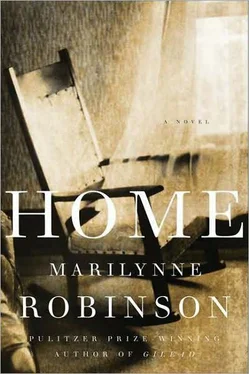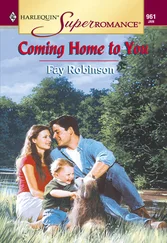TIRED AS SHE WAS, SHE COULD NOT POSSIBLY SLEEP. SHE felt lonely, lonely. She found a wire coat hanger in the front closet and straightened it, and went out to the barn. She pulled Jack’s shirt out of the exhaust pipe. He had managed to jam in the tails of it only. The body and the sleeves were lying on the ground, a greasy clay of perpetual dank and animal waste and vehicle seepage, old life and old use whose traces outlasted the memory of them. She caught one sock and then the other with the hanger. So, the proof of what he had intended was removed, and that was a comfort to her, as if she could now stop believing it entirely herself. She put the socks in the fireplace on a pyre of kindling. They made a smoldering fire. Then she filled the sink with water and scrubbed at the shirt, careful of the embroidery. It might be best to let it soak for a while. She went up the stairs as quietly as she could, and into Jack’s room. She found two pints of whiskey in the bottom drawer, as he had said. He stirred and raised his head and looked at her, irritated, but it was troubled sleep, not awakening. She took the bottles out to the orchard and emptied them on the ground, and put the empty bottles in the shed. Then she went back to the silent house. That shirt. It had to be put out of sight. She squeezed the water out of it and put it on a hanger, carried it out to the shed, and hung it from a nail in the wall behind the door.
How to announce the return of comfort and well-being except by cooking something fragrant. That is what her mother always did. After every calamity of any significance she would fill the atmosphere of the house with the smell of cinnamon rolls or brownies, or with chicken and dumplings, and it would mean, This house has a soul that loves us all, no matter what. It would mean peace if they had fought and amnesty if they had been in trouble. It had meant, You can come down to dinner now, and no one will say a thing to bother you, unless you have forgotten to wash your hands. And her father would offer the grace, inevitable with minor variations, thanking the Lord for all the wonderful faces he saw around his table.
She wished it mattered more that the three of them loved one another. Or mattered less, since guilt and disappointment seemed to batten on love. Her father and brother were both laid low by grief, as if it were a sickness, and she had nothing better to offer them than chicken and dumplings. But the thought that she could speak to them in their weary sleep with the memory of comfort lifted her spirits a little. There was a nice young hen in the refrigerator, and there were carrots. There were bay leaves in the cupboard. Baking powder. Lila would send Robby over with whatever she lacked, knowing better than to ask why Glory or Jack didn’t go to the store themselves. Good Lila. She might know some simple, commonplace treatment for hangover, some cool hand on the brow that would wake Jack from his sweaty sleep, as if penance were swept aside by absolution. If there were such a thing, Jack would know and would have asked for it, unless misery was the way he spoke to himself, unless he had meant to recruit his whole body to the work of misery. There would be a rightness in his grieving in every nerve. However slight her experience, she did know that. And she knew he would sleep for hours, and awake vague and somber.
So she bathed the hen and set it in water with the carrots and an onion and the bay leaves. Some salt, of course. And she turned on the heat. Poor little animal. This life on earth is a strange business.
SHE HAD SAT BY THE SPUTTERING RADIO, TRYING TO INterest herself in The High and the Mighty . She went into the kitchen to turn the little hen onto her belly, and she saw that a blue Chevrolet had pulled into the driveway. Teddy. Of course, Teddy would come just now. Glory felt anxiety, and relief, and resentment. If he had come even a week earlier, he’d have found everything much better, another atmosphere in the house. Instead, he was walking in on failure and shame. She should have called him weeks ago, asked him to come while her father was still a little sprightly and Jack was still all right, even, she had thought, healthy. At least not unhealthy, not miserable. She had felt, she knew now, that she was sustaining a familial peace — fragile, certainly, and only more remarkable for that. Jack, who had never trusted any of them, trusted her. Not always, not wholly, not without reservations of a kind he did not divulge and she could not interpret. Still, even Teddy would have envied the talking and joking and the moments of near-candor, the times they were almost at ease with each other. She had been so proud of all that, pleased to believe it was providential that she should be there, having herself just tasted the dregs of experience, having been introduced to something bleaker than ordinary failure — it was a sweet providence that sent her home to that scene of utter and endless probity, where earnest striving so predictably yielded success, and Boughton success at that, the kind amenable to being half-concealed by the rigors of yet more earnest striving. Not that she could entirely forget the bitterness of her chagrin, not that she preferred the course her life had taken to the one she had imagined for it. But she did feel she had been rescued from the shame of mere defeat by the good she was able to do her brother.
Teddy walked into the porch, into the kitchen, threw his arms around her, and kissed her forehead. “Hiya, babe,” he said, making a brief study of her face, noting and ignoring the weariness of it. “Good to see you! How’s it going? Do you mind if I make a few phone calls?”—all this in a very soft voice, since he knew his father was probably asleep. He leaned in the hallway, giving advice and assurance, making three attempts to reach someone who didn’t answer. Then he hung up the phone and came back and hugged her again, comforting her, though he said nothing. Teddy used to be just Jack’s height, a slightly sturdier version of him, without the tentativeness that made Jack always seem to be taking a step back. Now Teddy was taller, she thought, no doubt the effect of quiet purposefulness on the one hand and evasiveness and generalized reluctance on the other. Once again he studied her face. She had been frightened so recently, and she was sad, and so tired, and it was all surely visible to him. “I hope I haven’t come at a bad time,” he said. “It’s been hard to stay away. I finally gave in.”
“This is a good time. As good as any, I suppose.” What excuse was there for keeping him, all of them, away while their father dozed through whatever time remained to him, even though the old man himself did not ask her to send for them? Teddy could have blamed her for letting things get worse without calling him. It was pride, or it was shame that had made her hope Jack would recover himself enough to let the others see that things had been good between them. Though there was their father, too. But she saw nothing of anger or accusation in Teddy’s manner. A calm, affable man who went about his doctoring with scrupulous detachment and a heavy heart, he saw enough misery in the ordinary course of his life to avoid adding to it, except when compelled to on medical grounds.
“Is he here?”
She said, “He’s upstairs.”
“Would he mind if I said hello to him?”
She said, “Why should he mind?” and they laughed, ruefully. “I’ll tell him you’re here.”
JACK WAS LYING ON HIS BACK WITH AN ARM ACROSS HIS face, to shield his eyes from the light that came through the drawn blinds. When he heard her at the door he rolled away from her.
“What,” he said. “What is it.”
“Teddy’s here.”
He laughed. “I wondered when you were going to get around to that. Calling Teddy.”
Читать дальше












